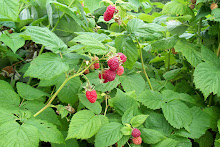 The trouble with taking pictures of worms is as soon as the light hits them, they disappear into the bin. I turn over a clump of bedding to find a mass of worms but by the time I grab the camera and focus, most of them are gone. They're fast little guys when they want to be. If you look very, very closely, you will see a few compost worms in the bin. And if you have amazing eyesight, you may even locate the little cocoon to the left near the green straw, it's orange.
The trouble with taking pictures of worms is as soon as the light hits them, they disappear into the bin. I turn over a clump of bedding to find a mass of worms but by the time I grab the camera and focus, most of them are gone. They're fast little guys when they want to be. If you look very, very closely, you will see a few compost worms in the bin. And if you have amazing eyesight, you may even locate the little cocoon to the left near the green straw, it's orange. The bin is doing very well now. It's almost time to replace the bedding and harvest the first castings of 2010. I had a bit of an issue in late fall. I had changed the bedding for but I didn't wring it out enough. I thought I did but obviously it was too wet. At first, because the top part of the bin was not too wet, all looked fine. After a while though, I started wondering were the worms were, the food I was giving them was not being eaten. So I dug deep and discovered a way-too-wet layer and very few worms. Even with the drainage holes, the bedding was soaking. So I added plain dry leaves and gently turned everything over so the wettest would be on top and dry out faster. I had little hope for the remaining worms. I considered just releasing them into my compost box and just re-start the worm bin in the Spring. But it was so cold by then I worried they'd all freeze before they could burrow deep enough down.
I was amazed at how fast those worms came back. It was noticeable in two or three weeks. After a month or so, food was disappearing at a good rate and worms abounded. It was a hard lesson to learn, though. Hard on me to see all my hard work drown and even harder on the worms. I think after I soak the new bedding, I'll actually lay it out for a bit to make sure it's not too wet. I have also made a habit to gently dig down right to the bottom every now and then to make sure the worms aren't learning to swim, it's hard to do the dog-paddle when you don't have legs.

6 comments:
Hey, we have a massive vermi composter here at the University of Ottawa. The secret to taking their picutre (that of the worms that is) is to just graba handful of them. Otherwise... yep they dive right to the bottom.
"Just grab a handful of them." Yeah, Jon, I'll get right on that...:)
A massive vermicomposter! How cool is that. I'd love to see pictures of that.
Thanks for writing about your worms. I've been interested in starting a worm composter myself but have been put of by the fact that everyone recommends buying red wigglers. Do I understand that you just chose worms out of your soil? Any hints for a new vermiculturist?
Thanks!
Gina
Oh, you'll love raising worms! Their castings will really add a punch to your gardens. It'll be great for homeschooling, too.
The worms from the soil are earthworms, they don't eat compost and they like to live deep in the ground and generally die in bins. I found my worms in my compost piles, I had three piles, rabbit manure pile, dead leaf pile, from the kitchen/garden pile. Now everyone said not to collect worms from the outside because they wouldn't survive but mine did and are doing great! The important thing is to identify the worms you have to make sure they'll do fine in a bin. I believe I have Dendrodrilus Rubidus. They are a compost worm, smaller the red wigglers but they do the job.
I used this website for identification, http://www.frogwatch.ca/english/wormwatch/resources/guide/about_guide_redworms.html It's a Canadian site but I think you'd find lots of good info. Like you, I wasn't crazy about getting worms that were not native to my area, invasive species can cause a lot of damage and worms are no exception. Good luck and please feel free to ask any questions. I'm not an expert but I'll try to answer as well as I can.
I'm making your overnight coffee cake recipe today, I can't wait to try it!
Thanks for answering! I had always heard that regular earthworms would not work - now I just need to keep my eyes peeled for other kinds of worms!
Thanks!
Gina
Good luck! I look forward to reading about your vermiculture experiences on your blog.
Post a Comment